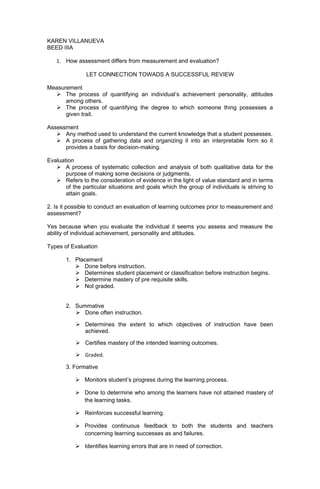
Karen villanueva
- 1. KAREN VILLANUEVA BEED IIIA 1. How assessment differs from measurement and evaluation? LET CONNECTION TOWADS A SUCCESSFUL REVIEW Measurement The process of quantifying an individual’s achievement personality, attitudes among others. The process of quantifying the degree to which someone thing possesses a given trait. Assessment Any method used to understand the current knowledge that a student possesses. A process of gathering data and organizing it into an interpretable form so it provides a basis for decision-making. Evaluation A process of systematic collection and analysis of both qualitative data for the purpose of making some decisions or judgments. Refers to the consideration of evidence in the light of value standard and in terms of the particular situations and goals which the group of individuals is striving to attain goals. 2. Is it possible to conduct an evaluation of learning outcomes prior to measurement and assessment? Yes because when you evaluate the individual it seems you assess and measure the ability of individual achievement, personality and attitudes. Types of Evaluation 1. Placement Done before instruction. Determines student placement or classification before instruction begins. Determine mastery of pre requisite skills. Not graded. 2. Summative Done often instruction. Determines the extent to which objectives of instruction have been achieved. Certifies mastery of the intended learning outcomes. Graded. 3. Formative Monitors student’s progress during the learning process. Done to determine who among the learners have not attained mastery of the learning tasks. Reinforces successful learning. Provides continuous feedback to both the students and teachers concerning learning successes as and failures. Identifies learning errors that are in need of correction.
- 2. 4. Diagnostic Identifies specific strengths and weaknesses in the students past and present learning. Determines rearing or persistent difficulties. Searches for the underlying causes of these difficulties. Helps formulate a plan for appropriate remedial instruction. TYPES OF SSESSMENT • Traditional assessment- refers to the forced-choice measures or multiple-choice tests, fill-in-the-blanks, true or false, matching type and like that have been and remain too common in education. • Performance assessment- an evaluation in which students are asked to engage in a complex task, often involving the creation of a product. • Portfolio assessment- a mode of assessment that involves gathering or collecting many different indicators of student’s progress in support of curricular goals in dynamic on-going and collaborative process. • Authentic assessment- is used to evaluate students work by measuring the product according to real life criteria the same criteria use to judge a published author would be used to evaluate student writing. Types of Measurement Direct Measurement Data-based systems can use direct measurement in providing exact measurement of behavioral performance or academic performance in any given subject area. For example, teachers can decide to collect data on whether students are able to comprehend reading passages during a reading class. Questions can be direct such as, "Who was the main character in the play?" to "What was the theme of the short story?" Teachers can use a recording chart with headings to chart areas of measurement in reading, math, history, writing or any subject area where consistent data can be collected on student performance and used to improve that student's performance. Time Measurement When teachers want to provide a consistent measurement of data collection for ascertaining whether gifted and exceptional students need additional challenge or rigor in instruction and outcome, they can create a chart marking data over a period of time. Teachers can decide frequency of when the data will be taken and whether the data is an observation or actual times of performance engagement.Data can then be calculated as a percentage of time over number of times or the frequency in which the student completed assignments and turned them in for grading.
